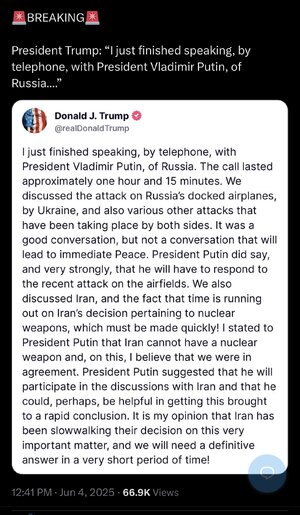So Trump welcomes a Russia sanctions bill?
From the editorial he linked:
“… The bill, which has a whopping
82 co-sponsors in the Senate, would impose “
bone-crushing” sanctions on Russia. Right now, Russia is suffering
double-digit inflation,
skyrocketing interest ratesand
catastrophic labor shortages. The only thing keeping the country’s economy from collapse is
revenue from oil and gas exports. This legislation would shut off the most important source of cash for the Kremlin by
barring energy transactionswith sanctioned Russian banks (which
President Joe Biden allowed to continue), and imposing a
500 percent secondary tariff on any country that purchases Russian-origin uranium, oil, natural gas, petroleum, or petroleum products and petrochemical products. This would give Trump the power to effectively drive Russian energy sales from the global market, which would crush the Russian economy and deny Putin the funds to continue his aggression against Ukraine.
…
Signing the bill does not mean Trump has to implement the sanctions immediately. The proposed sanctions take effect only after the president issues a formal determination that Putin is engaging in sanctionable acts as described in the bill, such as “
refusing to negotiate a peace agreement with Ukraine.”
If Trump is not comfortable making that determination, there is another option: He does not have to sign the bill immediately after Congress approves it. Once a bill is sent to the president, he has
10 days to sign or veto it. But nothing requires Congress to send the president a bill it has passed. Indeed, after it is approved in the House and the Senate, Senate Majority Leader John Thune (R-South Dakota) can
hold the bill at the deskindefinitely rather than sending it to the White House — giving Trump as much time as he needs before signing it.
…
Congress could give Trump even more leverage by adding a provision to the sanctions legislation that would authorize the sale of U.S. weapons to Ukraine, using
Foreign Military Financing (FMF) direct loans, like those we
provide to our allies and partners around the world. Such loans would cost taxpayers nothing — indeed they would earn a profit, because the loans come with interest that must be paid to the U.S. government. Congress could also create a transfer authority that permits frozen Russian assets to be used by Ukraine to buy U.S. weapons.
The combination of sanctions and arms is precisely what Trump promised he would do if Putin did not agree to peace. In March, he declared: “If Russia and I are unable to make a deal on stopping the bloodshed in Ukraine, and if I think it was Russia’s fault … I am going to put
secondary tariffs on oil, on all oil coming out of Russia.” And in an interview with me last year at Mar-a-Lago, he said that if Putin refused his peace efforts, he would
give Ukraine more weapons than it has ever gotten before….”

